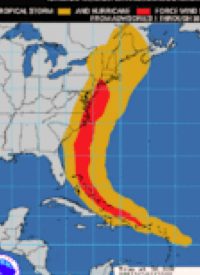
Not surprisingly, reports that the Federal Emergency Management Agency (FEMA) is running out of money have surfaced. The fund?s capacity has been maximized by the most recent natural disaster, Hurricane Irene (path shown at left), which is estimated to cost billions of dollars. Chron.com reports:
With less than $800 million in its disaster aid coffers, the Federal Emergency Management Agency has been forced to freeze rebuilding projects from disasters dating to Hurricane Katrina to conserve money for emergency needs in the wake of Irene. Lawmakers from states ravaged by tornadoes this spring, like Missouri and Alabama, are especially furious.
The news does not come as a surprise to lawmakers who have been warning for months that the cost of FEMA was unsustainable. The most recent warning came from Texas Congressman and Republican presidential hopeful Ron Paul prior to Hurricane Irene. According to Paul, there should have been no FEMA response to Hurricane Irene.
Theres no magic about FEMA. Theyre a great contribution to deficit financing and quite frankly they dont have a penny in the bank. We should be coordinated but coordinated voluntarily with the states. A state can decide. We dont need somebody in Washington, said Paul, who contends that all federal disaster relief is bad economics, bad morality, and bad constitutional law.
Even those lawmakers who have been less stringent about fiscal sanity than Paul, like House Majority Leader Eric Cantor warned that FEMAs assistance in Hurricane Irene would break the bank. All of us know that the federal government is busy spending money it doesnt have, warned Cantor.
FEMA is now openly admitting that it faces a shortfall of close to $5 billion for the upcoming budget year, and that is before Irene is accounted for.
According to FEMA spokeswoman Rachel Racusen, the estimates for Hurricane Irene is still too early to determine and it is uncertain whether the budget shortfall will be greatly impacted by those figures. Its just too soon to know what any uninsured losses will be, she said.
Chron.com writes on the impact of this shortfall:
As a result, funds to help states and local governments rebuild from this year’s tornadoes, as well as past disasters like hurricanes Katrina and Rita and the massive Tennessee floods of last spring, have been frozen. Instead, FEMA is only paying for the “immediate needs” of disaster-stricken communities, which include debris removal, food, water and emergency shelter.
FEMA administrator Craig Fugate said on Monday, Going into September being the peak part of hurricane season, and with Irene, we didnt want to get to the point where we would not have the funds to continue to support the previous impacted survivors as well as respond to the next disaster.
Representative Robert Aderholt admits, Even though the president himself said that we are going to do everything we can to help these communities rebuild, the rhetoric has not matched reality, and the Disaster Relief Fund is running out of money.
But Cantor asserts that if necessary, Congress will find money if there is a need for additional money. He adds, however, But those monies are not unlimited, and we have said we have to offset that.
More than likely, the money will be found in the homeland security spending bill for the next budget year, beginning on October 1. Chron.com adds that there is a provision in the recently passed debt limit and budget deal that would permit Congress to allocate billions of dollars in funds to FEMA disaster aid without making cuts elsewhere.
In the last 20 years, Congress has approved $130 billion to FEMAs disaster account. In the past, many for other items like school and sewer system projects have been frozen to provide immediate aid to disaster victims.
Currently, the FEMA disaster fund account holds less than $800 million.




